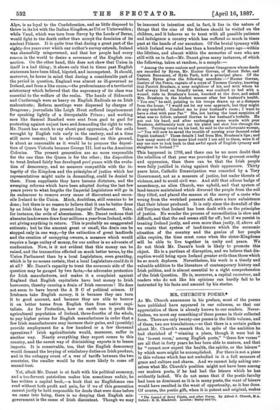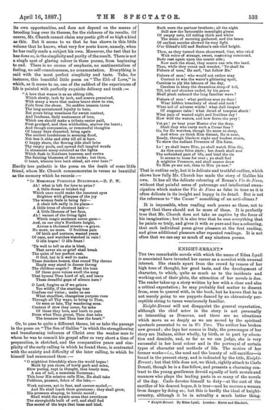MR. CHURCH'S POEMS"
As Mr. Church announces in his preface, most of the poems here published have appeared in our columns, so that our appreciation of them is already known to our readers. Never- theless, we must say something of these poems in their collected form. There are only twenty-one poems in the little volume, and of these, two are translations,—so that there is a certain pathos about Mr. Church's remark that, in spite of the ambition he had cherished of "winning a place, though it were but in the ' lowest room,' among English poets," "these few verses" are all that in forty years he has been able to mature, and that ho " cannot now expect the health, the spirits, or the leisure" by which more might be accomplished. For there is not a piece in this volume which has not embodied in it a full measure of grace and culture and charm. And we cannot help asking our- selves what Mr. Church's position might not have been among our modern poets, if he had had the leisure which he has evidently lacked. We do not mean that if the poetic faculty had been as dominant as it is in many poets, the want of leisure would have resulted in the want of opportunity, as it has done. Of course, the poetic gift, when it is potent and original, makes • The Legend of Saint 'NUB., and °that Poem. By Alfred J. aura, M.A. Oxford B. H. Blackwell. London: Seeley and Os. its own opportunities, and does not depend on the means of brooding long over its themes, for the richness of its results. Of course, Mr. Church cannot claim any poetic gift of so high a kind as this. But it seems to us that he has shown in this little volume that he knows, what very few poets know, namely, when he has really made a subject his own. Moreover, the test that he has done so, is the simplicity and purity of the result. There is not a single spot of glaring colour in these poems, from beginning to end. There is no excess of emphasis, no sentimentalism of feeling, no self-consciousness, no ornamentation. Everything is said with the most perfect simplicity and taste. Take, for instance, this beautiful little poem on " The Ebb of Love," in which, as it seems to us, one of the saddest of the experiences of life is painted with perfectly exquisite delicacy and truth :-
"A love that wanes is as an ebbing tide, Which slowly, inch by inch, and scarce perceived, With many a wave that makes brave show to rise, Fails from the shore. No sadden treason tarns The long-aeonstomed loyalty to hate, But years bring weariness for sweet content, And fondness, daily sustenance of love, Which use should make a tribute easier paid, First grudged, and then withholder, starves the heart ; And though compassion, or remorseful thoughts Of happy days departed, bring again The ancient tenderness in seeming flood, Not less it ebbs and ebbs till all is bare.
0 happy shore, the flowing tide shall brim Thy empty pools, and spread dull tangled weeds In streamers many-coloured as the lights Which flash in Northern heavens, and revive The fainting blossoms of the rocks; but thou, 0 heart, whence love bath ebbed, art ever bare !"
Hardly less pathetic is the poem on the death of some little friend, whom Mr. Church commemorates in verses as beautiful as the memory which he records :-
"IN MEMORIAM PUELLULE DULCI9sIME.—D. P. W.
Ah! what is left for love to prize ?
A little dress or trinket-toy Which once could make the innocent eyes Brighten with glimpses of the joy
The woman feels in being fair— A chair left sadly in its place— A little tress of chestnut hair—
A little likeness of her face, Ah ! vacant of the living light
Which magic sunbeam never gave—
And, on our city's Northern height, Across a thousand streets—a grave.
No more, no more. 0 fruitless pain Of birth and nurture, wasted years Of care, and watches watched in vain !
O idle hopes ! 0 idle fears !
'Tie well to tell us she is blest, That never sin or grief shall break The quiet of her perfect rest.
O God, but ie it well to make These desolate homes, that round Thy throne Haply may stand in denser throng The children-angels ? Must the tone Of these pore voices swell the song That hymns Thee Lord of all, and leave These dreadful gaps of silence here ?
0 Lord, forgive us if we grieve Too wildly, if the starting tear Confuse our vision ; make us see What steadfast, changeless purpose runs Through all Thy ways, to bring to Thee, Or soon or late, Thy wandering trona Content if slow they come, for sake Of those they love, and loath to part From what Thou givest, Thou dost take The treasure lest Thou lose the heart."
Or, to pass to quite a different theme, let us take the passage in the poem on "The Sea of Galilee "in which the strengthening and transforming influence of Christ over the weaker men to whom he was to commit his gospel after so very short a time of preparation, is sketched, and the comparative peace and sim- plicity of the early calling in which be found them, is contrasted with the anxiety and difficulty of the later calling, to which he himself had summoned them :—
" 0 mightiest friendship since the world began !
Mark by yon shore, of lowly garb and mien, Slow pacing, rapt in thought, that lonely man, A son of toil, a nameless Nazarene ; This hour His mission calls Him, He shall take
Publican, peasant, fisher of the lake,—
Weak natures, apt to fear, and narrow-souled,— And He shall teach them greatness ; they shall grow, His presence shaping, to heroic. mould ; Shall wield the myetio arms that overthrow The strongholds built of evil, and shall find The secret of the keys that loose and bind. Such were the partner brothers ; all the night Still saw the favourable moonlight gleam Of empty nets, till rolling thick and white The mists of morning gathered, and the beam Of earliest sunrise showed its may light O'er Gilead's hill and Baehan'e oak-clad height.
Then, as they turned them shoreward, One, who cried With voice of strange, sweet, mastering command, Bade oast again upon the nearer side; Now such the shoal, they scarce can win the land.
Then, while they count and wonder, ' Ye shall be Fishers of men,' He said, ' but follow Me.'
Fishers of men! who would not rather stay Content to win the water's glittering spoil, Careless to ply the labours of the day, Careless to sleep the dreamless sleep of toil, Till, toil and slumber ended, by his grave Shall plasIs unheard the long familiar wave Fishers of men! what perilous seas ye dare !
What hidden treachery of shoal and rock !
What toil of adverse winds ! what dull despair Of stagnant calm ! what dread of tempest shock !
What pain of wasted night and fruitless day !
How wild the waters, and how fierce the prey !
Yet go ! yo bear your Master o'er the deep.
Shall they who carry such a Caner fear ?
Go, for He watches, though He seem to sleep, And when ye think Him distant, He is near, Ready, through blackest night and loudest storm, To show the radiant Presence of His form.
Lo ! ye shall leave Him, ye shall watch Him die, As dies some felon slave ; but death shall seal The unfinished pact of life, and bind the tie It seems to loose for ever; ye shall feel A mightier Presence, and shall nearer draw To Him ye see not, than to Him ye saw."
That is outline only, but it is delicate and truthful outline, which shows how fully Mr. Church has made the story of Galilee his own. It has all the delicate colouring of Henan's Vie de Time, without that painful sense of patronage and intellectual eman- cipation which makes the Vie de Ante as false in tone as it is often delicate in its insight and happy in its detail. But is not the reference to " the Camar " something of an anti-climax P It is impossible, when reading such poems as these, not to regret that there should not be more of them. It is perfectly true that Mr. Church does not take us captive by the force of his imagination; but it is also true that he sees everything that he paints so truly, and gives it with so pure and fine a colouring, that each individual poem gives pleasure at the first reading, and gives additional pleasure after repeated readings. It is not often that we can say as much of any nineteen poems.



































 Previous page
Previous page